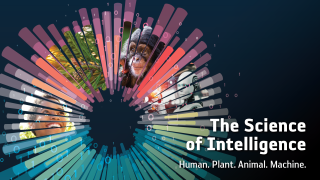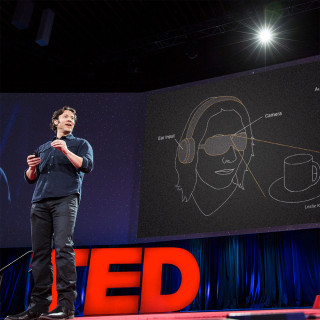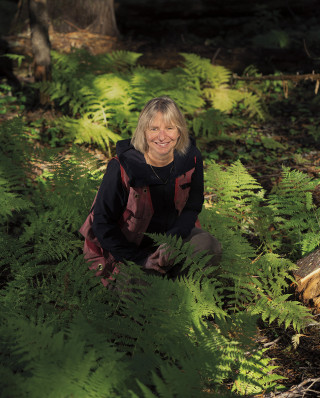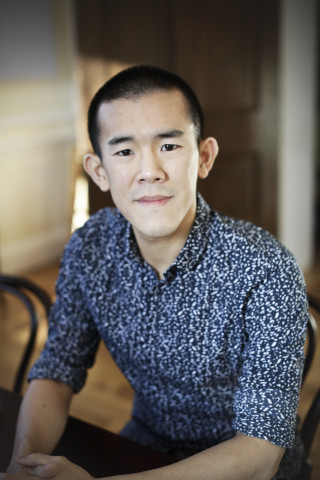Lecture Series History: 2024

In 2024, the Natural History Museum of Utah's annual Lecture Series explored the latest thinking on thinking with a theme of The Science of Intelligence: Human. Plant. Animal. Machine. Read on to learn more about the theme and speakers.
About the 2024 Lecture Series
What we know about intelligence is changing fast. Scientists are publishing groundbreaking research expanding our understanding of how animals view the world around them. We hear news of surprising findings that suggest plants may “think” in ways we never considered possible. And with Chat GPT’s sudden arrival, artificial intelligence – formerly the realm of science fiction – is now a presence in our daily lives.
Through a world-class lineup of experts, this year’s Lecture Series will delve deep into the science of reason and understanding, the ability to solve complex problems, and more. These four science storytellers will explore intelligence across a variety of forms – from the untold impacts of artificial intelligence to the hidden realms of animal senses to the interconnectedness of trees.
This year’s Lecture Series theme is inspired by the Museum’s current special exhibition, Becoming Jane: The Evolution of Dr. Jane Goodall. The exhibition shares the remarkable story of the life and work of renowned scientist Jane Goodall, whose early research delivered groundbreaking revelations on the intelligence of humankind’s closest living relatives, chimpanzees.
2024 Speakers
David Eagleman
What Does AI Mean for Humans? The Road to Augmented Intelligence

Photo courtesy of David Eagleman.
At the 2024 Lecture Series Keynote, David Eagleman will address whether human creatives are likely to find themselves unemployed by modern AI. Eagleman will explore another set of questions: while generative AI is blowing everyone's minds, is it intelligent like humans, or is it just playing impressive statistical games? Could AI reach or exceed our level of intelligence, and how would we know when it gets there? Traditional tests for intelligence, such as the Turing or Lovelace test, have long been surpassed. In this keynote address, David will propose a novel test of intelligence.
David Eagleman is a neuroscientist at Stanford University, an internationally bestselling author, and a Guggenheim Fellow. Dr. Eagleman’s areas of research include sensory substitution, time perception, vision, and synesthesia; he also studies the intersection of neuroscience with the legal system, and in that capacity he directs the Center for Science and Law. Eagleman is the author of many books, including Livewired, The Runaway Species, The Brain, Incognito, and Wednesday is Indigo Blue. He is also the author of a widely adopted textbook on cognitive neuroscience, Brain and Behavior, as well as a bestselling book of literary fiction, Sum, which has been translated into 32 languages, turned into two operas, and named a Best Book of the Year by Barnes and Noble. Dr. Eagleman writes for the Atlantic, New York Times, Economist, Time, Discover, Slate, Wired, and New Scientist, and appears regularly on National Public Radio and BBC to discuss both science and literature. He has been a TED speaker, a guest on the Colbert Report, and profiled in the New Yorker magazine. He has spun several companies out of his lab, including Neosensory, a company which uses haptics for sensory substitution and addition. He runs the science podcast Inner Cosmos and is the writer and presenter of The Brain, an Emmy-nominated television series on PBS and BBC.
Suzanne Simard
Finding the Mother Tree

Suzanne Simard is changing how people view trees and their connections to one another and to other living things in the forest. In this illuminating and accessible talk, Simard helps audiences understand just how vital trees are—to each other and to humans. Based on her incredible book, "Finding the Mother Tree: Discovering the Wisdom of the Forest," and her research at The Mother Tree Project, Simard shares her moving and deeply personal journey of discovering the interconnectedness of trees, explaining how they behave in many ways with characteristics ascribed to human intelligence and civil societies. In understanding these complex ecosystems, Simard emphasizes the critical need to rethink our relationship with our natural world so we can begin to heal our climate.
Suzanne Simard is a Professor of Forest Ecology at the University of British Columbia and the leader of The Mother Tree Project, which researches forest renewal practices that protect biodiversity against climate change. Dr. Simard’s work has been published widely, with over 170 scientific articles in peer-reviewed journals, including Nature, Ecology, and Global Biology. She is also co-author of the book "Climate Change and Variability." Her latest book, "Finding the Mother Tree," brings us into the intimate world of trees, exploring the ways in which trees learn and adapt their behaviors, remember the past, demonstrate agency over the future, and cooperate with a sophistication typically ascribed to humans. Dr. Simard’s research has been communicated broadly through TED Talks and TED Experiences, as well as articles and interviews in The New Yorker, National Geographic, The Globe and Mail, NPR, CNN, CBC, and many more.
Ed Yong
The Amazing Nature of Animal Senses

In this engaging lecture based on his 2022 New York Times Bestseller, An Immense World: How Animal Senses Reveal the Hidden Realms Around Us, Ed Yong invites audiences to enter a new dimension – the world as it is truly perceived by other animals. With wit and humor, Yong details the amazing ways in which animals experience aspects of the world to which we are oblivious.
Ed Yong is a British-American science journalist, a Pulitzer winner, and the author of two bestselling books. Named “the most important and impactful journalist" of 2020 by Poynter, Yong is the bestselling author of An Immense World: How Animal Senses Reveal the Hidden Realms Around Us and I Contain Multitudes: The Microbes Within Us and a Grander View of Life. He was awarded journalism’s top honor, the 2021 Pulitzer Prize for Explanatory Reporting, for his crucial coverage of the coronavirus pandemic. An accomplished speaker, Yong brings his vast scientific knowledge and engages his audiences through his insightful conversations about the pandemic, the animal kingdom, the challenges of science journalism, and more.
Artificial Intelligence Expert Panel
Join us for the final lecture in the 2024 Lecture Series, a panel discussion with local business leaders, scientists, and experts on the opportunities and challenges presented by the rapid adoption of artificial intelligence across a wide variety of industries. Through a moderated conversation, the speakers will explore a breadth of perspectives, information, and stories as they help us contemplate our collective future in a world with artificial intelligence. Read more about the panel speakers below.
Elizabeth Callaway
Elizabeth Callaway is an assistant professor in the Department of English at the University of Utah where she works at the intersections of digital humanities, environmental humanities, and contemporary literature. Her first book, Eden’s Endemics: Narratives of Biodiversity on Earth and Beyond investigates the stories we tell in literature and science about the multiplicity of life on Earth. Her current book project, The Black Box and the Blue Marble examines the relationship between artificial intelligence and the natural environment. She was a selected participant in the National Humanities Center’s Program in Responsible AI for which she has developed three courses for the University of Utah that look at AI from a humanities perspective.
Zach Holmquist
Zach Holmquist is a tech entrepreneur and innovator, recognized for his contribution as the co-founder of Teem, a pioneering software focused on enhancing workplace experience, culminating in its strategic acquisition by WeWork in 2018. Currently, as the technical co- founder of Seer, Zach is at the forefront of revolutionizing the accessibility of legislative policies through cutting-edge AI-powered technology.
Mike Kirby
Robert M. “Mike” Kirby, PhD, is a Professor of Computer Science and part of the leadership team of the University of Utah Responsible AI Initiative. He is a leader in the synergistic combination of applied mathematics and computer science applied to real-world engineering problems. He is also the author of over 200 peer-reviewed journal and conference publications spanning scientific computing, machine learning, and computational science and engineering. He was formerly the Executive Director of the Utah Informatics Initiative (2019-2023) and Director of the Scientific Computing and Imaging Institute (2018-2020), both at the University of Utah.
2024 Lecture Series Sponsors
Founding Underwriter
R. Harold Burton Foundation
Underwriter
Cultural Vision Fund
Gold Sponsors
M Lazy M Foundation
Rio Tinto Kennecott
Silver Sponsors
The DiFiore Family Foundation
Diana George
Paula Swaner Sargetakis and Joe Sargetakis | Frog Bench Farms
Wolf Clark Foundation